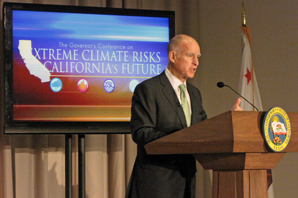The one-day conference reinforced the need to prepare for coming climate impacts

Governor Jerry Brown says he wants to “intensify California’s leadership” on the climate front, but his climate conference at the California Academy of Sciences on Thursday offered no new initiatives toward that end.
The one-day event was a series of panel discussions emphasizing the importance of science and how it can reinforce policy decisions on climate change.
The invitation-only event included several noteworthy speakers, including Dr. Rajendra Pachauri, chair of the United Nations Intergovernmental Panel on Climate Change, business mogul and biofuels-for-planes evangelist Sir Richard Branson, and White House environmental advisor Nancy Sutley.
But unlike some previous climate conferences organized by former Governor Arnold Schwarzenegger, also in attendance, there were no major policy decisions or partnerships announced. Perhaps most noteworthy was that unlike those previous conferences, the emphasis was on “adaptation” measures — preparation for climate impacts as opposed to “mitigation,” ways of reducing greenhouse gas emissions. Brown cryptically mentioned that a major announcement on California’s water supply was forthcoming, but declined to offer details.
Schwarzenegger was — and continues to be — a relentless climate hawk, whereas Brown’s path to pursuing climate action has been

less well articulated. The governor did take the opportunity to assail those who oppose policies to confront climate change, saying “We will fight them every step of the way.”
This meeting of the minds also brought together officials and experts from varied backgrounds, who agreed that extreme weather events are more likely to become the norm, and become more disruptive to the state’s economy, as well as to public health (NOAA released a national map showing “extreme weather events,” with June 2011 listing a record of more than 6,000).
Though nothing groundbreaking emerged from the conference, Carl Anthony, recognized as a founder of the environmental justice movement, said he doesn’t despair. “We have enough of an opportunity to make big changes,” he said after the event ended. “If we jump in and face these problems head on, we will be able to look back and see how far we’ve come.”
